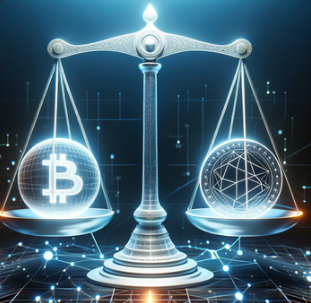The Impact of Blockchain on Elections: Promises and Controversies
godidgo.com
12/1/20245 min read


Understanding Blockchain Technology
Blockchain technology represents a significant shift in how digital information can be securely stored and shared. Fundamentally, it is a decentralized digital ledger system that records transactions across multiple computers so that the record cannot be altered retroactively without the consensus of the network. This decentralized nature eliminates the risk of a single point of failure, making it inherently more secure compared to traditional data storage methods.
One of the key characteristics of blockchain is its immutability; once data has been added to the chain, it is exceedingly difficult to change. Each transaction forms a block, which is linked to the preceding block, creating a chain of information that is virtually tamper-proof. This structure enables transparency, as all participants in the network have access to the entire ledger, ensuring that all transactions can be independently verified without the need for a central authority.
The operational aspects of blockchain include several core components. Nodes are individual computers that participate in the network, validating and relaying transactions. Every time a transaction occurs, it is recorded in a block, which is then distributed across all nodes to maintain consistency and security. This collaborative model provides several advantages over traditional voting systems, which often rely on central databases that can be more susceptible to fraud or errors.
By integrating blockchain technology into elections, potential benefits such as increased voter confidence and reduced administrative costs can be realized. The transparency provided by blockchain ensures that every vote is tracked and verifiable, a feature that can enhance public trust in the electoral process. Overall, understanding the fundamentals of blockchain technology is crucial as it lays the groundwork for exploring its potential applications in the realm of elections.
Promises of Blockchain in Electoral Processes
The emergence of blockchain technology has generated significant interest in its potential to enhance electoral processes worldwide. At its core, blockchain presents a decentralized, transparent, and secure framework that addresses critical vulnerabilities in traditional voting systems. One of the main benefits of integrating blockchain into elections is the heightened security it offers to voter identities and ballots. By employing cryptographic methods, blockchain can ensure that voter data remains confidential and tamper-proof, safeguarding against unauthorized access and potential data breaches.
Another promising aspect is the increased transparency that blockchain can bring to the electoral process. Each transaction, or vote, is recorded on an immutable ledger accessible to all participants. This openness helps stakeholders, including voters, observers, and election officials, verify the integrity of the election in real time. Consequently, transparency can build public trust and confidence in election outcomes, which is often a significant challenge in contemporary democratic practices.
Furthermore, the application of blockchain can serve as a powerful tool against electoral fraud. With its ability to create a verifiable trail of votes, any discrepancies can be promptly identified and addressed. For instance, pilot projects in countries like Estonia and Sierra Leone have successfully implemented blockchain-based voting systems. In Estonia, the use of blockchain for e-voting has demonstrated a secure and efficient voting process, ultimately contributing to increased voter participation. Similarly, Sierra Leone's 2018 pilot project employed blockchain to enhance the accuracy of vote counts and streamline election logistics, illustrating the technology's applicability in diverse contexts.
Additionally, blockchain can improve voter accessibility, particularly for those facing barriers due to geographical constraints or disabilities. By enabling remote voting solutions, blockchain can empower a broader demographic to exercise their voting rights, further enriching the democratic process. Overall, the promises of blockchain in electoral processes present a compelling case for a transformative shift in how elections are conducted and perceived.
Controversies Surrounding Blockchain Voting
The implementation of blockchain technology in electoral processes has generated significant attention, as well as a host of controversies that merit discussion. One of the primary concerns relates to the digital divide, which emphasizes how access to technology can severely limit participation in blockchain voting systems. In many regions, especially in underdeveloped areas, individuals may lack reliable internet access or the necessary devices to engage in digital voting. This could inadvertently disenfranchise segments of the population, undermining the principle of inclusive democracy.
Cybersecurity risks also loom large when discussing blockchain voting. While the technology promises enhanced security due to its decentralized nature, vulnerabilities still exist. Notably, instances of cybersecurity breaches, where sensitive information may be compromised, raise alarm. These incidents highlight the ongoing threat from malicious actors who may seek to manipulate or seriously disrupt the electoral process. Citizens may rightly struggle to trust a system that appears susceptible to hacking or other forms of cyber interference, despite assurances of security from developers and electoral authorities.
The complexity of blockchain technology presents additional challenges. For many voters, the technical aspects of blockchain can be overwhelming and confusing. This complexity could lead to a lack of understanding regarding how their votes are secured, recorded, and counted, further exacerbating feelings of uncertainty about the voting process. Ensuring that voters comprehend how to effectively navigate a blockchain voting system is crucial to its success, yet the necessity for comprehensive voter education programs is often overlooked.
Lastly, case studies illustrating failures or criticisms of blockchain voting systems serve to emphasize existing pitfalls. For example, an incident in a blockchain voting pilot program raised questions about the process's transparency and accessibility. Continuous scrutiny and a thorough evaluation of blockchain in elections are essential in shaping a robust understanding of its challenges and capabilities. Thus, while blockchain holds promise, its implementation in voting systems is fraught with significant controversies that demand careful consideration.
The Future of Elections with Blockchain Technology
The integration of blockchain technology into electoral processes presents significant opportunities for enhancing the integrity and efficiency of elections. As digital transformation becomes increasingly prominent in governance, blockchain stands out as a potentially revolutionary approach to secure voting systems. Various initiatives are currently being explored worldwide, with several pilot projects testing its efficacy in real-world elections. These developments highlight the growing recognition of blockchain's potential to mitigate issues such as voter fraud, identity verification, and the management of electoral data.
However, the road ahead is not without challenges. Regulatory considerations are paramount, as lawmakers and electoral bodies must establish comprehensive frameworks that ensure the secure implementation of blockchain in elections. Current legislation may need to adapt to accommodate this emerging technology, taking into account aspects such as data protection, privacy, and accessibility. Moreover, the global landscape varies significantly in terms of technological readiness and public trust, which could impact the pace of blockchain adoption in different regions.
Public opinion plays a crucial role in the successful implementation of blockchain in elections. Education and awareness initiatives are essential to address any concerns surrounding security and transparency. Stakeholders—including governments, technology providers, and civil society—must engage in meaningful dialogue to foster a better understanding of how blockchain can enhance electoral processes. Furthermore, the evolution of technology itself may lead to new methodologies for voting and result tabulation that could fundamentally reshape public participation in elections.
In conclusion, while blockchain technology holds promising potential for the future of elections, careful consideration must be given to regulatory frameworks, public perceptions, and technological advancements. By addressing these aspects, blockchain could pave the way for more secure, transparent, and credible electoral systems, ultimately fortifying democracy as a whole.

Get in touch
Feel free to contact us to inquire about any of the Web2/DNS and Web3/Onchain domains showcased on our platform. We are open to receiving proposals and evaluating direct purchase offers for all the digital assets featured.
Our team is also available to explore tailored agreements and negotiated sales, ensuring a smooth and efficient acquisition process that aligns with your specific needs.
Connect with us to amplify your identity across both the Web2/DNS & Web3/Onchain landscape. Together, let's redefine the future of digital identities and brands.
Contact us now to elevate your DIDs & Brands to new heights, because in the world of Go DID Go! your Digital Identity is not just owned; it's celebrated!
Contact Us
info@godidgo.com




